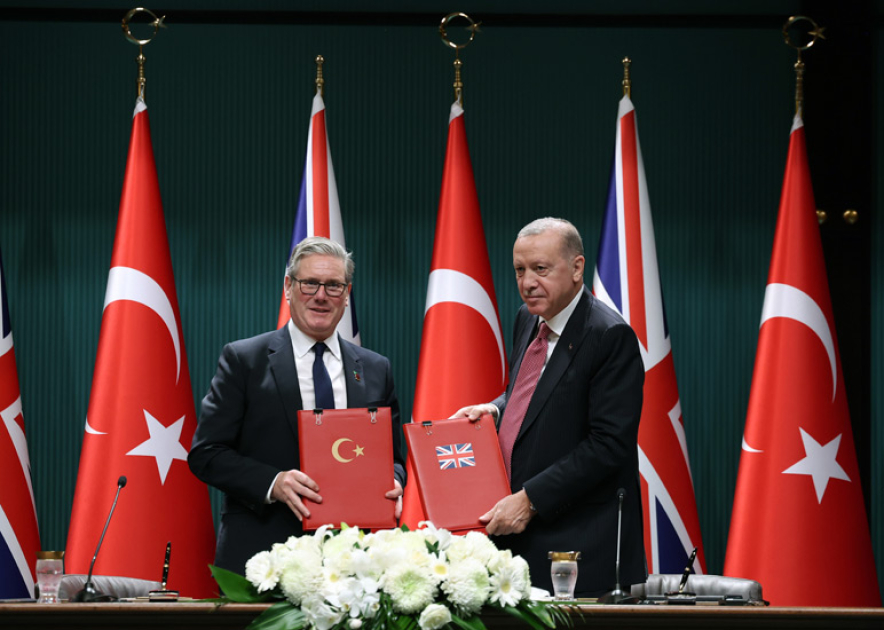UK and Turkey Sign £8 Billion Deal for 20 Eurofighter Typhoon Jets

During the official visit of UK Prime Minister Keir Starmer to Ankara on October 27, 2025, an agreement was signed with Turkish President Recep Tayyip Erdoghan
for the delivery of 20 new Eurofighter
Typhoon jets, worth up to £8
billion (approximately $10.7 billion). This marks the first new Typhoon contract from the
United Kingdom since 2017.
The contract stipulates that BAE Systems (UK) will receive around £4.6 billion in revenue from the deal. Production will take place
at British manufacturing sites,
including Warton (Lancashire),
helping to sustain up to 20,000 jobs.
The first deliveries are planned for
2030, with continued production throughout the 2030s.
Thus, Turkey is
strengthening its air force infrastructure, transitioning from aging
aircraft to modern European combat platforms. The purchase is viewed as an “interim solution” until the launch of
Turkey’s indigenous fifth-generation
fighter jet, KAAN, expected to enter service around 2028. Turkey’s strategic location – a
bridge between Europe and the Middle
East – makes it a key element of NATO’s
southeastern defense structure.
The deal also helps maintain
Typhoon production lines, crucial for the UK’s defense industry and employment,
while reinforcing Britain’s position as a major arms exporter and security
partner in Europe and beyond. From NATO’s perspective, strengthening an
ally on such a critical Black Sea-Mediterranean
axis enhances collective defense.
Despite the strategic benefits, the deal has drawn criticism – concerns over human rights and democratic standards in
Turkey have been raised in the UK
Parliament and the media.
The supply of the aircraft is only part of the process; training, logistics, missile integration, and maintenance will
also be significant challenges for Turkey.
Having been
excluded from the F-35 program due to the purchase of Russian S-400 systems,
Turkey is now pursuing diversification of defense suppliers. This move reshapes
the strategic balance in the region. Turkey aims to demonstrate that it is not
only a regional actor but also an active European security partner, capable of
acting independently and modernizing. For the UK, the agreement helps bolster
its defense industrial base and project foreign policy influence. The further
development of this partnership will depend on two key factors: how quickly
Turkey can integrate the aircraft, and how effectively the UK provides support,
training, and logistics. Additionally, observers will watch whether this deal
could heighten tensions with neighboring countries (e.g., Greece) or within
NATO due to growing arms competition.
 Latest news
Latest news Latest news
Latest newsA Winged Shadow Over the World: Why Russia Showcased Its New Nuclear Missile Project?
26.Oct.2025
Russia’s Birth Rate Falls to Its Lowest Level in 200 Years
25.Oct.2025
Russia Responds to New Western Sanctions: Moscow Declares Readiness for Prolonged Pressure
24.Oct.2025
Pashinyan: Armenia, Azerbaijan, and Georgia should use global attention to turn the South Caucasus into a key transit hub
23.Oct.2025
Without Russia: The Armenian-Azerbaijani Agenda Takes on a New Dimension
22.Oct.2025
Between a Rock and a Hard Place: The Political Situation Forces Netanyahu into a Difficult Choice
21.Oct.2025
Serbia’s European Integration: Prospects and Obstacles
21.Oct.2025
Ukrainian Drones Set Fire to Russia’s Largest Gas Plant, Gas Intake from Kazakhstan Suspended
20.Oct.2025
Trump and Zelensky in Washington: The Return of “Hardline Support” Policy
19.Oct.2025
Activist Margretta Mirzoyan on the Political Mood in Armenia
18.Oct.2025

 28 Oct 2025
28 Oct 2025








